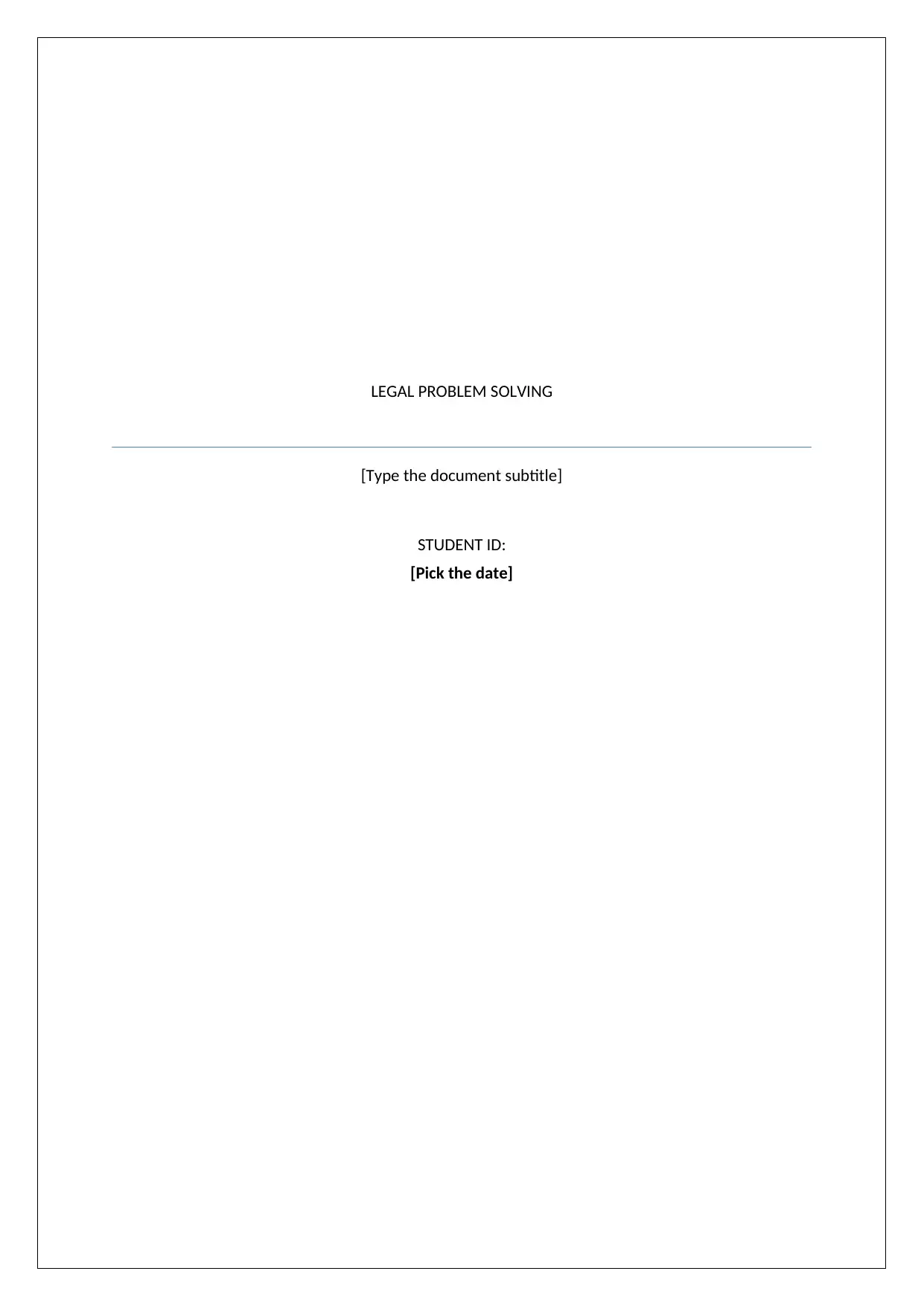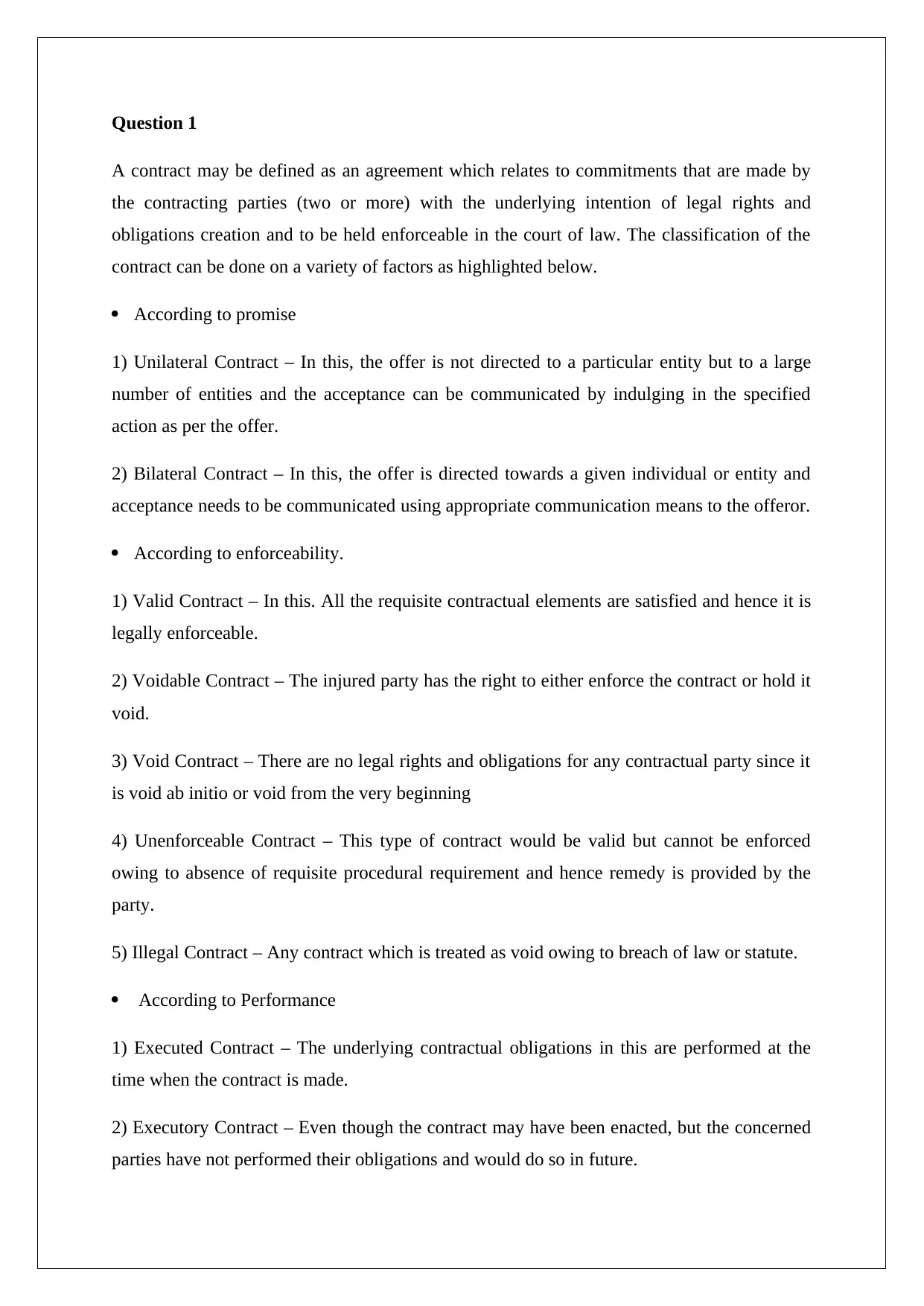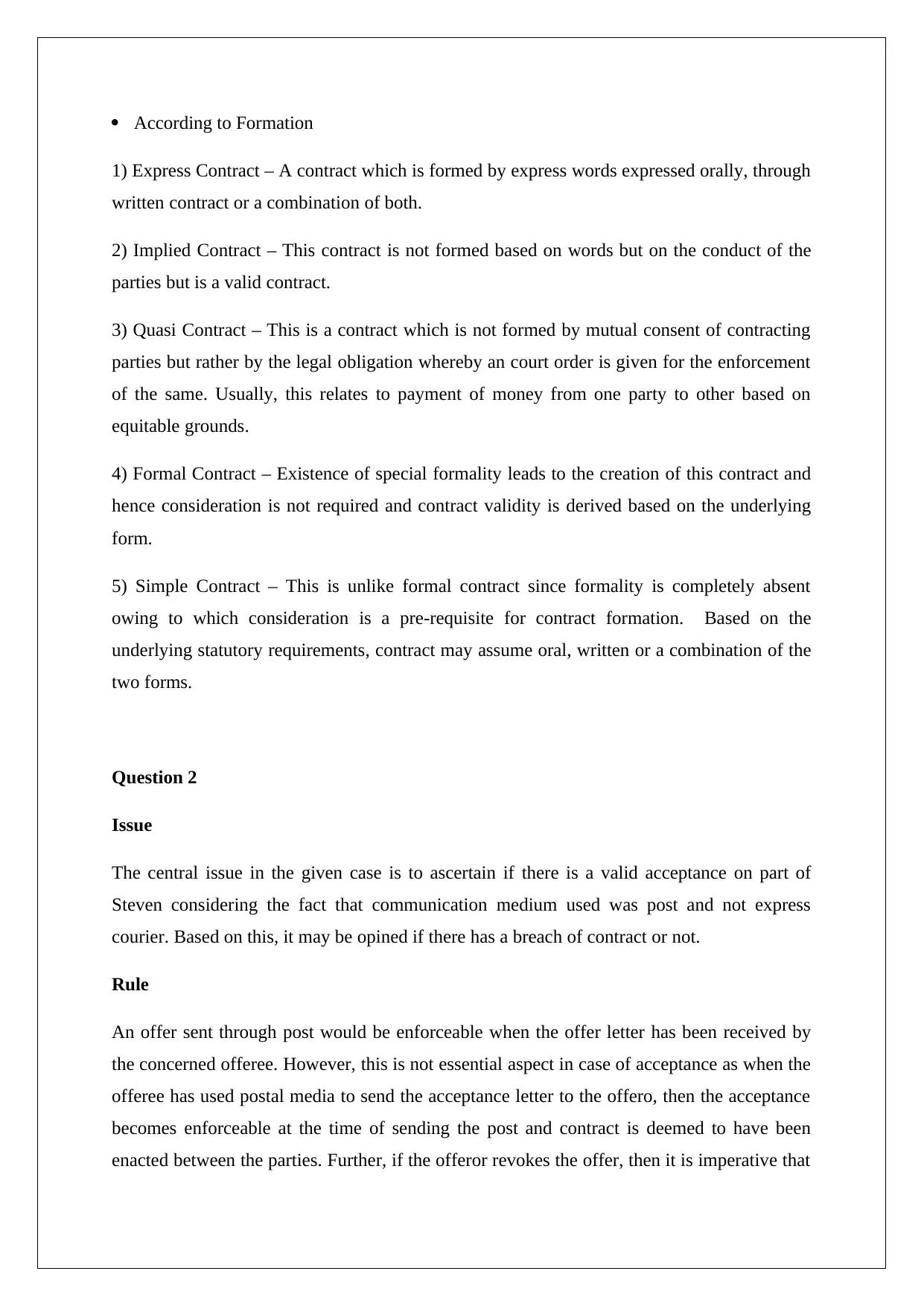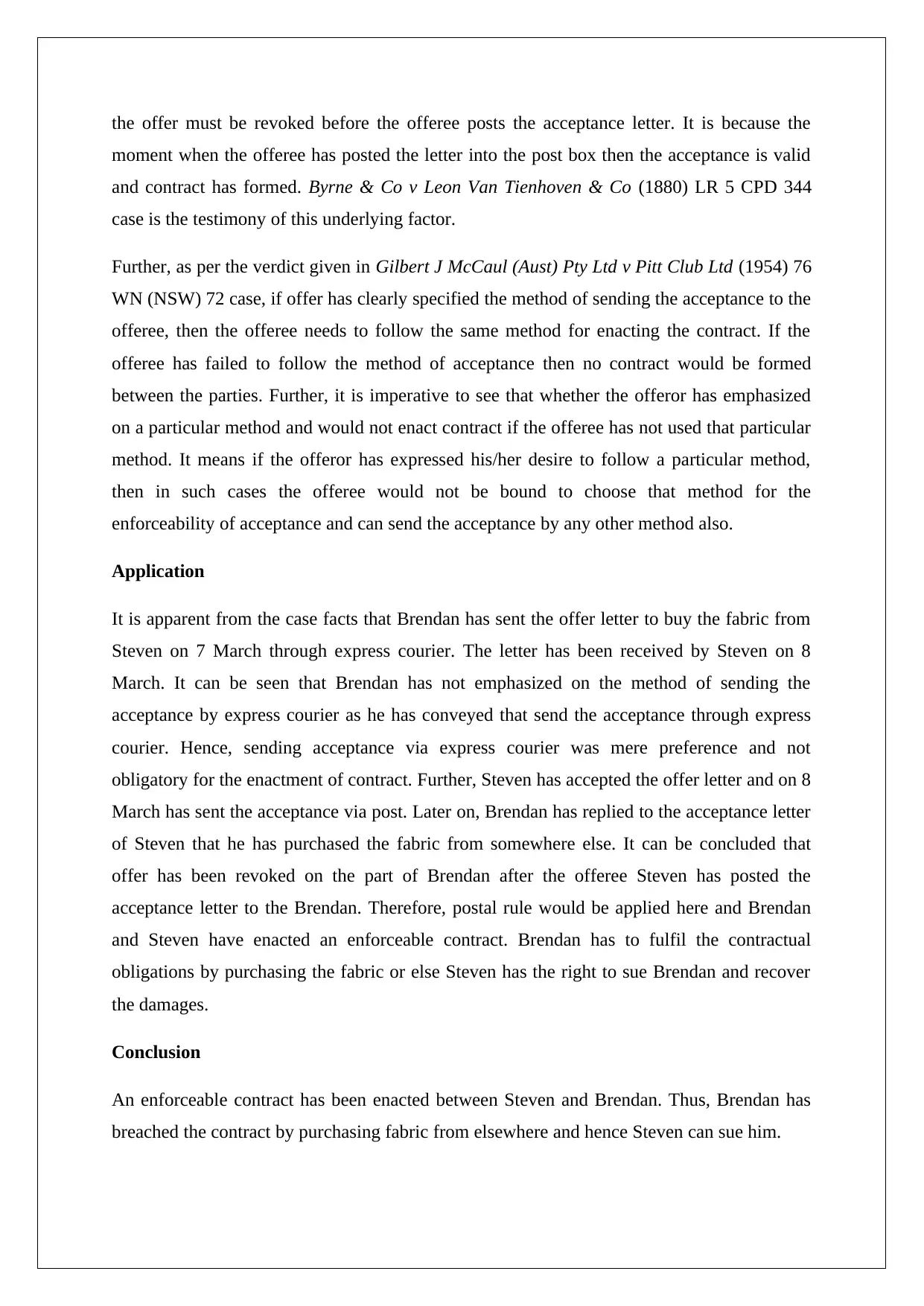Evaluating Contractual Obligations: Acceptance and Breach Analysis
VerifiedAdded on 2023/06/07
|4
|1129
|446
Case Study
AI Summary
This case study delves into a contract law scenario where Brendan offers to buy fabric from Steven, specifying a reply via express courier. Steven accepts but sends the acceptance by post, which arrives later than an express courier would have. Brendan, in the meantime, buys the fabric elsewhere, leading Steven to claim breach of contract. The analysis focuses on whether a valid contract was formed, considering the postal rule and Brendan's preference for express courier. The conclusion, based on relevant case law such as Byrne & Co v Leon Van Tienhoven & Co and Gilbert J McCaul (Aust) Pty Ltd v Pitt Club Ltd, is that a binding contract was indeed formed when Steven posted his acceptance, making Brendan liable for breach of contract and subject to potential damages.

LEGAL PROBLEM SOLVING
[Type the document subtitle]
STUDENT ID:
[Pick the date]
[Type the document subtitle]
STUDENT ID:
[Pick the date]
Paraphrase This Document
Need a fresh take? Get an instant paraphrase of this document with our AI Paraphraser

Question 1
A contract may be defined as an agreement which relates to commitments that are made by
the contracting parties (two or more) with the underlying intention of legal rights and
obligations creation and to be held enforceable in the court of law. The classification of the
contract can be done on a variety of factors as highlighted below.
According to promise
1) Unilateral Contract – In this, the offer is not directed to a particular entity but to a large
number of entities and the acceptance can be communicated by indulging in the specified
action as per the offer.
2) Bilateral Contract – In this, the offer is directed towards a given individual or entity and
acceptance needs to be communicated using appropriate communication means to the offeror.
According to enforceability.
1) Valid Contract – In this. All the requisite contractual elements are satisfied and hence it is
legally enforceable.
2) Voidable Contract – The injured party has the right to either enforce the contract or hold it
void.
3) Void Contract – There are no legal rights and obligations for any contractual party since it
is void ab initio or void from the very beginning
4) Unenforceable Contract – This type of contract would be valid but cannot be enforced
owing to absence of requisite procedural requirement and hence remedy is provided by the
party.
5) Illegal Contract – Any contract which is treated as void owing to breach of law or statute.
According to Performance
1) Executed Contract – The underlying contractual obligations in this are performed at the
time when the contract is made.
2) Executory Contract – Even though the contract may have been enacted, but the concerned
parties have not performed their obligations and would do so in future.
A contract may be defined as an agreement which relates to commitments that are made by
the contracting parties (two or more) with the underlying intention of legal rights and
obligations creation and to be held enforceable in the court of law. The classification of the
contract can be done on a variety of factors as highlighted below.
According to promise
1) Unilateral Contract – In this, the offer is not directed to a particular entity but to a large
number of entities and the acceptance can be communicated by indulging in the specified
action as per the offer.
2) Bilateral Contract – In this, the offer is directed towards a given individual or entity and
acceptance needs to be communicated using appropriate communication means to the offeror.
According to enforceability.
1) Valid Contract – In this. All the requisite contractual elements are satisfied and hence it is
legally enforceable.
2) Voidable Contract – The injured party has the right to either enforce the contract or hold it
void.
3) Void Contract – There are no legal rights and obligations for any contractual party since it
is void ab initio or void from the very beginning
4) Unenforceable Contract – This type of contract would be valid but cannot be enforced
owing to absence of requisite procedural requirement and hence remedy is provided by the
party.
5) Illegal Contract – Any contract which is treated as void owing to breach of law or statute.
According to Performance
1) Executed Contract – The underlying contractual obligations in this are performed at the
time when the contract is made.
2) Executory Contract – Even though the contract may have been enacted, but the concerned
parties have not performed their obligations and would do so in future.

According to Formation
1) Express Contract – A contract which is formed by express words expressed orally, through
written contract or a combination of both.
2) Implied Contract – This contract is not formed based on words but on the conduct of the
parties but is a valid contract.
3) Quasi Contract – This is a contract which is not formed by mutual consent of contracting
parties but rather by the legal obligation whereby an court order is given for the enforcement
of the same. Usually, this relates to payment of money from one party to other based on
equitable grounds.
4) Formal Contract – Existence of special formality leads to the creation of this contract and
hence consideration is not required and contract validity is derived based on the underlying
form.
5) Simple Contract – This is unlike formal contract since formality is completely absent
owing to which consideration is a pre-requisite for contract formation. Based on the
underlying statutory requirements, contract may assume oral, written or a combination of the
two forms.
Question 2
Issue
The central issue in the given case is to ascertain if there is a valid acceptance on part of
Steven considering the fact that communication medium used was post and not express
courier. Based on this, it may be opined if there has a breach of contract or not.
Rule
An offer sent through post would be enforceable when the offer letter has been received by
the concerned offeree. However, this is not essential aspect in case of acceptance as when the
offeree has used postal media to send the acceptance letter to the offero, then the acceptance
becomes enforceable at the time of sending the post and contract is deemed to have been
enacted between the parties. Further, if the offeror revokes the offer, then it is imperative that
1) Express Contract – A contract which is formed by express words expressed orally, through
written contract or a combination of both.
2) Implied Contract – This contract is not formed based on words but on the conduct of the
parties but is a valid contract.
3) Quasi Contract – This is a contract which is not formed by mutual consent of contracting
parties but rather by the legal obligation whereby an court order is given for the enforcement
of the same. Usually, this relates to payment of money from one party to other based on
equitable grounds.
4) Formal Contract – Existence of special formality leads to the creation of this contract and
hence consideration is not required and contract validity is derived based on the underlying
form.
5) Simple Contract – This is unlike formal contract since formality is completely absent
owing to which consideration is a pre-requisite for contract formation. Based on the
underlying statutory requirements, contract may assume oral, written or a combination of the
two forms.
Question 2
Issue
The central issue in the given case is to ascertain if there is a valid acceptance on part of
Steven considering the fact that communication medium used was post and not express
courier. Based on this, it may be opined if there has a breach of contract or not.
Rule
An offer sent through post would be enforceable when the offer letter has been received by
the concerned offeree. However, this is not essential aspect in case of acceptance as when the
offeree has used postal media to send the acceptance letter to the offero, then the acceptance
becomes enforceable at the time of sending the post and contract is deemed to have been
enacted between the parties. Further, if the offeror revokes the offer, then it is imperative that
⊘ This is a preview!⊘
Do you want full access?
Subscribe today to unlock all pages.

Trusted by 1+ million students worldwide

the offer must be revoked before the offeree posts the acceptance letter. It is because the
moment when the offeree has posted the letter into the post box then the acceptance is valid
and contract has formed. Byrne & Co v Leon Van Tienhoven & Co (1880) LR 5 CPD 344
case is the testimony of this underlying factor.
Further, as per the verdict given in Gilbert J McCaul (Aust) Pty Ltd v Pitt Club Ltd (1954) 76
WN (NSW) 72 case, if offer has clearly specified the method of sending the acceptance to the
offeree, then the offeree needs to follow the same method for enacting the contract. If the
offeree has failed to follow the method of acceptance then no contract would be formed
between the parties. Further, it is imperative to see that whether the offeror has emphasized
on a particular method and would not enact contract if the offeree has not used that particular
method. It means if the offeror has expressed his/her desire to follow a particular method,
then in such cases the offeree would not be bound to choose that method for the
enforceability of acceptance and can send the acceptance by any other method also.
Application
It is apparent from the case facts that Brendan has sent the offer letter to buy the fabric from
Steven on 7 March through express courier. The letter has been received by Steven on 8
March. It can be seen that Brendan has not emphasized on the method of sending the
acceptance by express courier as he has conveyed that send the acceptance through express
courier. Hence, sending acceptance via express courier was mere preference and not
obligatory for the enactment of contract. Further, Steven has accepted the offer letter and on 8
March has sent the acceptance via post. Later on, Brendan has replied to the acceptance letter
of Steven that he has purchased the fabric from somewhere else. It can be concluded that
offer has been revoked on the part of Brendan after the offeree Steven has posted the
acceptance letter to the Brendan. Therefore, postal rule would be applied here and Brendan
and Steven have enacted an enforceable contract. Brendan has to fulfil the contractual
obligations by purchasing the fabric or else Steven has the right to sue Brendan and recover
the damages.
Conclusion
An enforceable contract has been enacted between Steven and Brendan. Thus, Brendan has
breached the contract by purchasing fabric from elsewhere and hence Steven can sue him.
moment when the offeree has posted the letter into the post box then the acceptance is valid
and contract has formed. Byrne & Co v Leon Van Tienhoven & Co (1880) LR 5 CPD 344
case is the testimony of this underlying factor.
Further, as per the verdict given in Gilbert J McCaul (Aust) Pty Ltd v Pitt Club Ltd (1954) 76
WN (NSW) 72 case, if offer has clearly specified the method of sending the acceptance to the
offeree, then the offeree needs to follow the same method for enacting the contract. If the
offeree has failed to follow the method of acceptance then no contract would be formed
between the parties. Further, it is imperative to see that whether the offeror has emphasized
on a particular method and would not enact contract if the offeree has not used that particular
method. It means if the offeror has expressed his/her desire to follow a particular method,
then in such cases the offeree would not be bound to choose that method for the
enforceability of acceptance and can send the acceptance by any other method also.
Application
It is apparent from the case facts that Brendan has sent the offer letter to buy the fabric from
Steven on 7 March through express courier. The letter has been received by Steven on 8
March. It can be seen that Brendan has not emphasized on the method of sending the
acceptance by express courier as he has conveyed that send the acceptance through express
courier. Hence, sending acceptance via express courier was mere preference and not
obligatory for the enactment of contract. Further, Steven has accepted the offer letter and on 8
March has sent the acceptance via post. Later on, Brendan has replied to the acceptance letter
of Steven that he has purchased the fabric from somewhere else. It can be concluded that
offer has been revoked on the part of Brendan after the offeree Steven has posted the
acceptance letter to the Brendan. Therefore, postal rule would be applied here and Brendan
and Steven have enacted an enforceable contract. Brendan has to fulfil the contractual
obligations by purchasing the fabric or else Steven has the right to sue Brendan and recover
the damages.
Conclusion
An enforceable contract has been enacted between Steven and Brendan. Thus, Brendan has
breached the contract by purchasing fabric from elsewhere and hence Steven can sue him.
1 out of 4
Related Documents
Your All-in-One AI-Powered Toolkit for Academic Success.
+13062052269
info@desklib.com
Available 24*7 on WhatsApp / Email
![[object Object]](/_next/static/media/star-bottom.7253800d.svg)
Unlock your academic potential
Copyright © 2020–2026 A2Z Services. All Rights Reserved. Developed and managed by ZUCOL.





